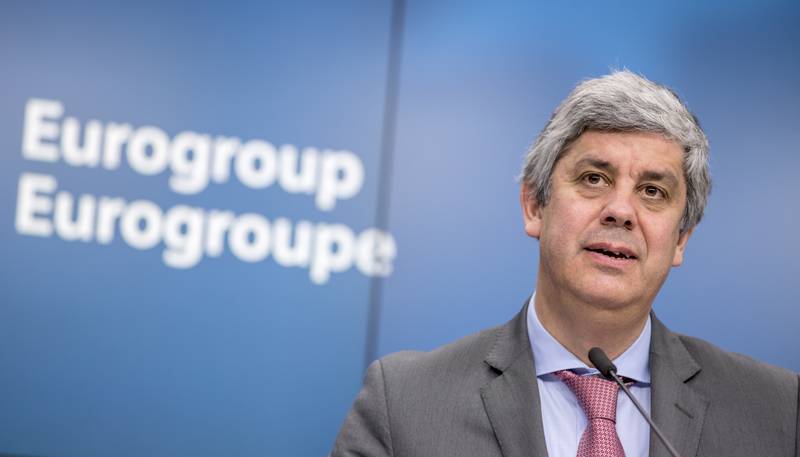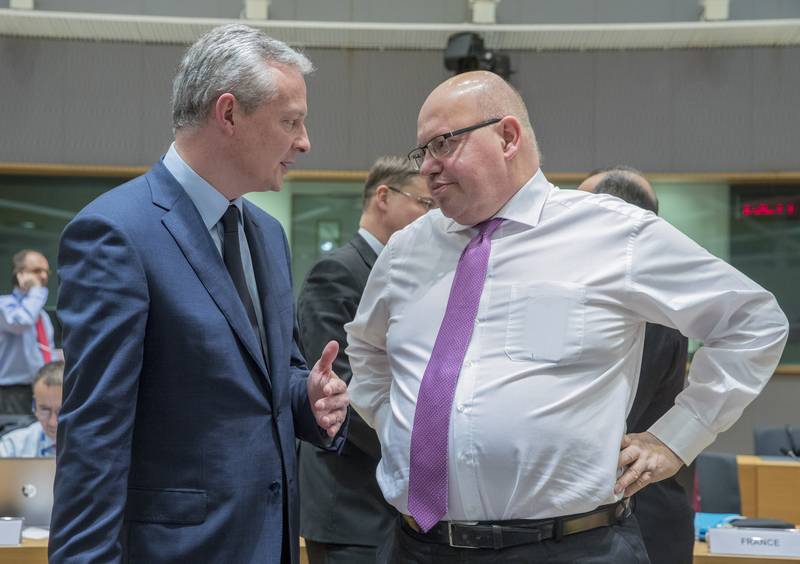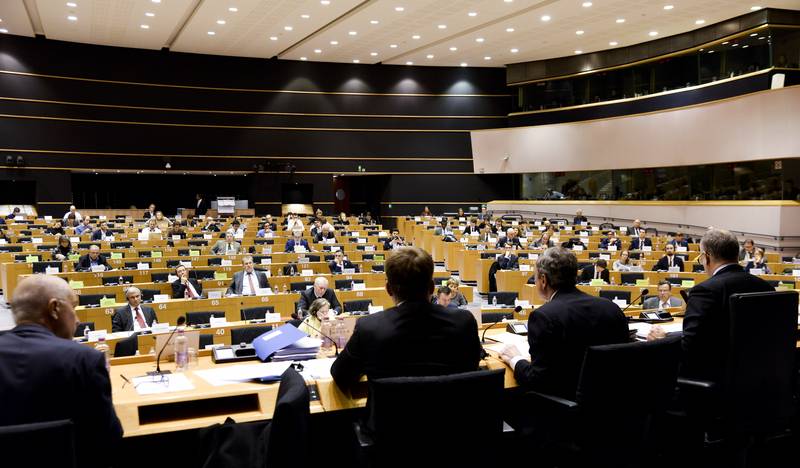February Eurogroup Opened the Season of Horse Trading with EU Top Jobs
Adelina Marini, February 21, 2018
 The meeting of the eurozone finance ministers on February 19th could have passed completely unnoticed, even for the biggest Eurogroup fans, if it were not for the election of Spanish Finance Minister Luis De Guindos for vice president of the European Central Bank. The meeting did not produce breaking news on the major issues on the agenda: the Greek bailout programme, the post-programme surveillance of Ireland, the euro area future, and the completion of the banking union. The election of the Spanish Eurogroup veteran, however, caused a significant media storm because it raises the question of whether the red thin line of ECB independence has been crossed by electing for one of the highest positions in the bank a strongly politicised figure against the will of the bank itself and the European Parliament.
The meeting of the eurozone finance ministers on February 19th could have passed completely unnoticed, even for the biggest Eurogroup fans, if it were not for the election of Spanish Finance Minister Luis De Guindos for vice president of the European Central Bank. The meeting did not produce breaking news on the major issues on the agenda: the Greek bailout programme, the post-programme surveillance of Ireland, the euro area future, and the completion of the banking union. The election of the Spanish Eurogroup veteran, however, caused a significant media storm because it raises the question of whether the red thin line of ECB independence has been crossed by electing for one of the highest positions in the bank a strongly politicised figure against the will of the bank itself and the European Parliament.
Luis De Guindos had for years appetite for a high European post after he failed twice to sit in the Eurogroup president's chair. His ambition was not just personal. The stakes were national because Spain, the fourth largest euro area economy, has for years been marginalised in terms of appointments at the top of EU institutions. The balance in the selection of people for key European positions has become much harder since the EU bubbled up to 28 member states, and during the euro area crisis there was an unwritten rule that the bailed out countries cannot even think of taking a high post.
The situation is now different and, again, all cards and players are at the table. The big rotation of leaders' seats of European institutions started with the election of the Portuguese Mario Centeno as head of the most important decision-making format of the euro area - the Eurogroup. His election was to a large extent foretold, as euinside wrote, and in this sense it was much easier because a political choice was to be made among equals - all candidates have to be finance ministers of euro area countries. Although Portugal was for a long time preparing for the position, for the first time there were more candidates which created a feeling of greater democracy.
The case with the vice-presidential seat at the ECB, however, is different. This is a very narrowly specialised and important banking position. The ECB vice president is a member of the bank's executive board. The task of the board is to prepare the Governing Council's meetings where, apart from the executive board, members are also all central bank governors of the euro area. The current members of the executive board are ECB chief Mario Draghi (Italy), his deputy Vitor Constancio (Portugal), and the ordinary members Benoit Coeure (France), Sabine Lautenschlaeger (Germany), Yves Mersch (Luxembourg), Peter Praet (Belgium). Sabine Lautenschlaeger is also a deputy chief of the supervisory board of the Single Supervisory Mechanism, and Peter Praet is a chief economist of the ECB.
All of them have 8-year long mandates, which cannot be renewed. The oldest member currently is Vitor Constancio, who is on the board since June 2010. It is for his seat that in January the Eurogroup opened a contest but by the 19 February meeting only two applications were filed - of Luis De Guindos and of the Irish central bank's governor Philip Lane. The Irish candidate withdrew his application literally minutes before the beginning of the ministers' meeting on Monday afternoon. ECB and EP hoped that  he would be selected as he is more appropriate for the position than the Spanish finance minister. De Guindos will be the first ECB executive board member who does not have a proper CV for the position.
he would be selected as he is more appropriate for the position than the Spanish finance minister. De Guindos will be the first ECB executive board member who does not have a proper CV for the position.
All other members have such experience. Vitor Constancio was twice a governor of Banco de Portugal, Benoit Coeure was never a head of a central bank but he was a deputy director of the French Treasury, Sabine Lautenschlaeger was a deputy to the Deutsche Bundesbank president, Yves Mersch was governor of Banque centrale du Luxembourg, and Peter Praet was executive director of Banque Nacionale de Belgique. The Treaty on the Functioning of the EU does not explicitly say that the members of the executive board must have held a central bank position, but Article 283 says that the election must be made among recognised specialists with professional expertise in monetary or banking issues.
Luis De Guindos has been a minister of economy and competitiveness since 2011. Before that he was an adviser of the bank which marked the beginning of the global financial crisis - Lehman Brothers. A crisis which had severe impact on Europe and especially on Spain. De Guindos remained on his position adviser for Europe and a director of the subsidiary for Spain and Portugal until Lehman Brothers' collapse in 2008. Later, as a minister, he managed to avoid Spain being put in a bailout regime by negotiating a rescue loan only for the banking sector. Under his leadership, Spain managed to restructure its banking sector and implemented painful reforms which brought the country back on the track of economic growth.
The assembling of the big party, geographic and European jigsaw puzzle has begun
After Philip Lane's withdrawal from the race, the 19 finance ministers approved Luis De Guindos unanimously, and on the next day (20 February) the Council of Ministers confirmed the Eurogroup decision and sent a recommendation to the European Council, which has to sign the decision on 22 March so that De Guindos can take the post on 1 June. According to Eurogroup chief Mario Centeno, the election process was competitive. "The vacancy was open and all countries were able to send applications and candidates for the position", he said and added that Minister De Guindos has a very rich CV and a profile of a decision-maker, and his experience reveals a track record of good judgements.
"I am very much confident that Luis will add to the range of skills needed in the executive board of the ECB. And I trust that he will perform his role with independence in the interest of euro area citizens as the other members do", Mr Centeno added. Pressed by journalists Mario Centeno said that not all ECB executive board members had previous experience as central bankers, "so this is not a prerequisite". He denied speculation De Guindos's election was part of the ongoing horse trading of key EU posts.
 Journalistic questions seemed to have irritated economic Commissioner Pierre Moscovici (France, Socialists and Democratic) as he, quite exasperatedly, answered that not all finance ministers are political figures. "But, you know that Vitor Constancio has been a finance minister and that he had even been a secretary general of a party, which was not from the EPP? I think that politicians sometimes can be legitimate towards positions which are not fully political", he said but omitted to mention that Vitor Constancio was also governor of the Portuguese central bank twice.
Journalistic questions seemed to have irritated economic Commissioner Pierre Moscovici (France, Socialists and Democratic) as he, quite exasperatedly, answered that not all finance ministers are political figures. "But, you know that Vitor Constancio has been a finance minister and that he had even been a secretary general of a party, which was not from the EPP? I think that politicians sometimes can be legitimate towards positions which are not fully political", he said but omitted to mention that Vitor Constancio was also governor of the Portuguese central bank twice.
De Guindos's election is another piece of the puzzle which is starting to assemble in the coming year. In 2019, several of the European top jobs will be vacant. This means seeking a difficult balance between geographic, national and political representation. Regretfully, gender representation is not yet a key factor despite promises of European leaders. In November 2019 expires the term of Mario Draghi as ECB president. For his seat Deutsche Bundesbank chief Jens Weidmann has been for a long time warming up. He has been for years critical of the monetary policies of the Italian Draghi. According to a poll by Bloomberg, several names are circulating as potential candidates for Mario Draghi's seat, apart from Jens Weidmann, among whom are also the head of the French national bank François Villeroy de Galhau, Philip Lane, and even Christine Lagarde, who is currently heading the International Monetary Fund.
According to the poll, however, Jens Weidmann is far ahead of all others with 84 points (out of 100). Second is the French governor with 26 points, followed by Philip Lane with 23, and Christine Lagarde with 15. Among the potential candidates is also the chairman of the European Stability Mechanism (the euro area's permanent bailout fund) Klaus Regling (Germany). Most of the stakes, though, are for Jens Weidmann, whose candidature could meet resistance from southern countries which were strongly against austerity policies during the crisis. With the election of Luis De Guindos, however, who proved himself through the years a loyal ally of Berlin, a serious potential obstacle has been removed on Jens Weidmann way, who is also a close ally of German Chancellor Angela Merkel.
The choice of a successor of Mario Draghi has several stakes. One of them is monetary policy change, which has become a very difficult and risky task in a growingly volatile global environment. Expectations are that under Draghi's leadership it is possible the ECB to start tightening monetary policy but his latest statements suggest that there are still no conditions for that because the main objective - inflation to reach the target of "close to but below 2%" - has not been reached. Mario Draghi has become quite theoretical in the past year which shows that the new global environment has significantly changed and the available economic and financial models no longer provide sufficiently clear recipes. After the end of the January Governing Council meeting, Mario Draghi said that the discussion on a change of monetary policy forward guidance has not yet started.
Another stake for the next ECB chief is euro area future and, more specifically, the banking union. If Germany gets for the first time the ECB presidency it would be far more inclined to step back on the most controversial issues linked to the deepening of euro area integration. All this will go in parallel with the horse trading of heads of the European Commission, the European Council, a new high representative for the foreign and security policy.
In the European Parliament, criticism to Luis De Guindos's election came from the Socialists and Democrats group and the Greens/EFA group. The spokeswoman of the S&D on economic and monetary issues, Pervenche Beres (France), said that during the informal hearing of the two candidates for the ECB vice president post Philip Lane emerged the better candidate. "The choice of De Guindos raises several question marks. Having been a finance minister of Spain since 2011, his appointment  could create a conflict of interest and undermine the independence of the governance of the ECB", she said.
could create a conflict of interest and undermine the independence of the governance of the ECB", she said.
Acting S&D group leader Udo Bullmann (Germany) pointed to another problem. "De Guindos’ appointment will not improve the deficit of women in top jobs at the ECB. We believe that the EU must do a better job in respecting gender balance for top positions", he said and added that the group will very closely analyse its position before the vote in parliament.
The spokesman on economic and financial issues of the Greens and the European Free Alliance, Sven Giegold (Germany), believes that the Eurogroup has done a disservice of the ECB in terms of confidence. "When the Eurogroup appoints its own member, it demonstrates its own conflict of interest. Philip Lane clearly was the better candidate, therefore it is embarrassing that he was turned down". He, too, said that time is ripe a woman to be part of the ECB leadership. "We will do our utmost to achieve this in the coming weeks and months", Sven Giegold added.
Luis De Guindos himself promised he will work for ECB's independence but hinted there might be a change of approach. He firmly denied any conditions were attached to his choice.
 Federica Mogherini | © Council of the EU
Federica Mogherini | © Council of the EU | © Council of the EU
| © Council of the EU Mario Draghi | © European Parliament
Mario Draghi | © European Parliament